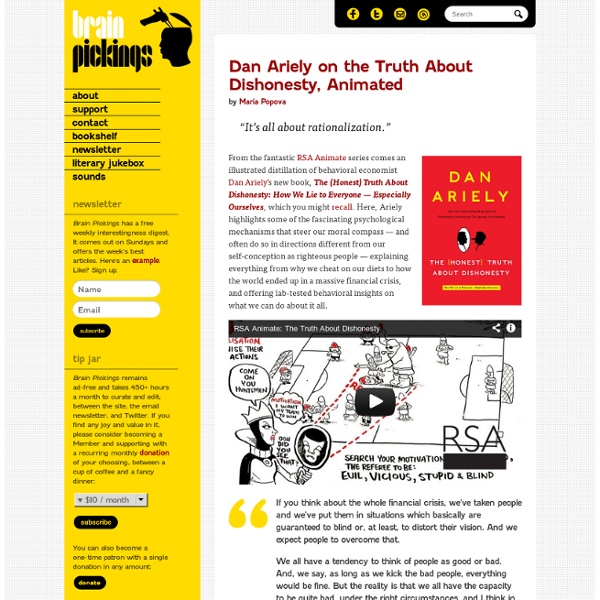



The Psychology of Trust in Life, Learning, and Love by Maria Popova The science of why tit-for-tat isn’t the best strategy for cooperation and why you should hear out your hunches. “When you trust people to help you, they often do,” Amanda Palmer asserted in her beautiful meditation on the art of asking without shame. But what does it really mean to “trust,” and perhaps more importantly, how can we live with the potential heartbreak that lurks in the gap between “often” and “always”? That’s precisely what psychologist David DeSteno, director of Northeastern University’s Social Emotions Lab, explores in The Truth About Trust: How It Determines Success in Life, Love, Learning, and More (public library). DeSteno, who has previously studied the osmosis of good and evil in all of us and the psychology of compassion and resilience, argues that matters of trust occupy an enormous amount of our mental energies and influence, directly or indirectly, practically every aspect of our everyday lives. The short answer is that we have to.
Trying Not to Try: How to Cultivate the Paradoxical Art of Spontaneity Through the Chinese Concept of Wu-Wei by Maria Popova “Our modern conception of human excellence is too often impoverished, cold, and bloodless. Success does not always come from thinking more rigorously or striving harder.” “The best way to get approval is not to need it,” Hugh MacLeod memorably counseled. We now know that perfectionism kills creativity and excessive goal-setting limits our success rather than begetting it — all different manifestations of the same deeper paradox of the human condition, at once disconcerting and comforting, which Edward Slingerland, professor of Asian Studies and Embodied Cognition at the University of British Columbia and a renowned scholar of Chinese thought, explores in Trying Not to Try: The Art and Science of Spontaneity (public library | IndieBound). Our lives, Slingerland argues, are often like “a massive game of Mindball,” when we find ourselves continually caught in this loop of trying so hard that we stymie our own efforts. Art by Austin Kleon from 'Show Your Work.' Share on Tumblr
Isaac Asimov on Optimism vs. Cynicism about the Human Spirit by Maria Popova Why cynicism is, above all, a disservice to our own happiness. “As long as there is one upright man, as long as there is one compassionate woman,” E.B. White wrote in a letter to a man who had lost faith in humanity, “the contagion may spread and the scene is not desolate.” A beautiful and soul-expanding counterpart to the power of optimism in the human spirit that White advocates comes from science-fiction icon Isaac Asimov, found in his posthumously published It’s Been a Good Life (public library) — a rich selection of the author’s letters, diary entries, and his three prior autobiographies, edited by his spouse, Janet Jeppson Asimov, which also gave us Asimov’s wisdom on humanism and science vs. spirituality. The book itself is titled after some of Asimov’s last words to his wife, but the most magnificent embodiment of his faith in life’s goodness comes from a letter to one of his friends. Donating = Loving Brain Pickings has a free weekly newsletter. Share on Tumblr
Build Trust with Others Using the Johari Window Model